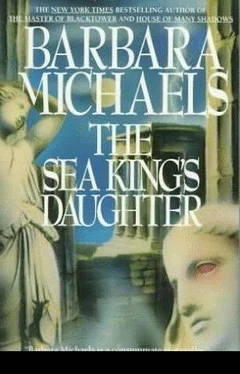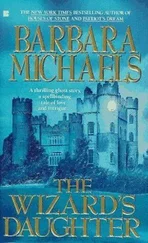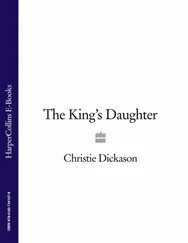Barbara Michaels - The Sea King’s Daughter
Здесь есть возможность читать онлайн «Barbara Michaels - The Sea King’s Daughter» весь текст электронной книги совершенно бесплатно (целиком полную версию без сокращений). В некоторых случаях можно слушать аудио, скачать через торрент в формате fb2 и присутствует краткое содержание. Жанр: Детектив, на английском языке. Описание произведения, (предисловие) а так же отзывы посетителей доступны на портале библиотеки ЛибКат.
- Название:The Sea King’s Daughter
- Автор:
- Жанр:
- Год:неизвестен
- ISBN:нет данных
- Рейтинг книги:3 / 5. Голосов: 1
-
Избранное:Добавить в избранное
- Отзывы:
-
Ваша оценка:
- 60
- 1
- 2
- 3
- 4
- 5
The Sea King’s Daughter: краткое содержание, описание и аннотация
Предлагаем к чтению аннотацию, описание, краткое содержание или предисловие (зависит от того, что написал сам автор книги «The Sea King’s Daughter»). Если вы не нашли необходимую информацию о книге — напишите в комментариях, мы постараемся отыскать её.
The Sea King’s Daughter — читать онлайн бесплатно полную книгу (весь текст) целиком
Ниже представлен текст книги, разбитый по страницам. Система сохранения места последней прочитанной страницы, позволяет с удобством читать онлайн бесплатно книгу «The Sea King’s Daughter», без необходимости каждый раз заново искать на чём Вы остановились. Поставьте закладку, и сможете в любой момент перейти на страницу, на которой закончили чтение.
Интервал:
Закладка:
The window was wide open. Sunlight made the whitewashed walls so bright they hurt my eyes, and there were so many flies they sounded like a vacuum cleaner. I had a couple of little red bites I hadn’t had when I arrived in Crete, but otherwise I felt fine.
I went downtown and had breakfast. The coffee was the kind you have to strain through your teeth. We call it Turkish coffee at home, but I had been cautioned against using that term. The long Turkish occupation of Greece still rankles; the beverage is Greek coffee, if you please. Anyhow, the bread was good and the jam was a little bit like glue, and after I got my tongue unstuck, thanks to the water that is served with the smallest order in Greece, I went down to the dock and found that I could hitch a ride on a local boat that was going to Santorini that afternoon. On the way back to my boardinghouse I met Hans. He suggested I stick around for a few days and go on to Rhodes with him. I said “No, thanks.” He kissed me good-bye; and then he decided he would go with me, wherever I was going; and I had some trouble getting rid of him.
My hostess and I parted on excellent terms. I practiced my Greek on her. I already knew how to say “Thank you” and “Please” and “Where is the toilet/café/hotel/boat/dog of the innkeeper?” Then I shouldered my stuff and started out for the dock. I only had one suitcase, in addition to my backpack, but it was a big suitcase. It held my diving gear. Frederick had assured me I could rent gear on Thera, but I don’t like using secondhand stuff. I only hoped Frederick was right about getting tanks and air for them.
I had to hang around the dock for a couple of hours before the captain of the boat got back from his afternoon nap. Jim would have had fits at the sight of the boat. It was a filthy tub that looked as if it would founder in a slight breeze. The deck still showed the traces of its last dozen cargoes-animal droppings, oil, fish scales, and so on. I scraped out a spot and sat down. It’s about a hundred and twenty kilometers from Crete to Thera, and from the looks of the scow I figured she’d be lucky to make twenty kilometers an hour. I overestimated the speed. It was late the next morning before we got in.
Santorini is in the guidebooks. I had read about it, but a verbal description can’t possibly prepare a visitor for the real thing. It’s fantastic.
In an aerial view the group of islands looks like a half-eaten sugar cookie from which a giant child has taken a big bite and let the fragments fall onto his shining sea-blue plate. The main island, Thera, is the largest, crescent-shaped piece. Smaller islands lie like fallen crumbs, outlining the perimeter of the former crater of the volcano. In the center of the bay are two other islands, black intrusions on the surface of the clean sea. They are not parts of the cookie, but new volcanic cores, risen phoenix-like out of the chasm. One of them, Nea Kaimeni, is still active.
Chugging through the channel between Thera and the next-largest island, Therasia, we entered the caldera. The water was a rich teal blue, thirteen hundred feet deep. It seemed funny to think we were sailing over what had been the populated central peak of a circular island. We passed by the ominous black cone of Nea Kaimeni, a desolate heap of cinders and slag, with a trail of pale-green vapor rising from its fumarole. Ahead was a stunning view-the red, white, and black cliffs of Thera, rising sheer a thousand feet out of the blue water, as sharply perpendicular as if they had been cut by the snap of gigantic teeth. The geological strata were defined like the layers of a cake-the black of congealed lava, the pinky-red of pumice, and the awesomely thick layer of white ash that fell during the eruption of 1450 B.C., before the final paroxysm blew the guts out of the island. The cliff glistened in the sunlight, and I remembered Plato’s description of the Royal City of Atlantis, built of red and black and white stone.
On top of the cliff, like a starched crocheted edging, were the sugar-white buildings of the island’s largest town, Phira. I was reminded of a model of the Taj Mahal I’d once made out of sugar cubes for a school project. The town had an Oriental look, with cupolas and domes and arched porticoes.
Other buildings, docks and warehouses and shops, clustered at the foot of the cliff. Connecting the lower and upper towns was a zigzag path that went up the sheer face of the cliff in a series of acute switchbacks.
As soon as we had docked I made arrangements to have my stuff carried up to the hotel, and then I considered my own procedure. People usually ride donkeys up the path; it’s too steep for a wheeled vehicle, and the black lava cobblestones are slippery. The donkeys looked as if they were in worse shape than I was, so I decided to walk. I had been sitting for hours and needed to loosen up.
It wasn’t a walk, it was a climb, and by the time I got to the top I was regretting not having taken a donkey. Blinded with sweat and heaving like a spavined horse, I collapsed in the shade of a fig tree, mopped my wet face, and got my eyes focused. And what do you suppose I saw first? Right. My father. He was sitting at a table at a sidewalk café, staring straight at me with an expression of icy disapproval. I paid no attention, being much more interested in the tall glass on the table in front of him. My throat was as dry as death.
I started walking toward him. Then it occurred to me that maybe I shouldn’t speak till I was spoken to, so I changed course, heading for one of the other tables. Two of them were taken, but the third had only one occupant. He saw me coming and pulled out a chair. I fell into it. The man grinned and shoved his glass of water toward me. I drained it, pushed the damp hair out of my eyes, and looked at him.
He was worth looking at. As tanned as the Minoan athletes in the frescoes, with brown hair sun-bleached in streaks, he had a thin face and a friendly smile. Handsome? I don’t know. After I’ve known someone for a while I can’t judge his appearance. All my friends look beautiful to me. All I remember of that first impression was that he was brown. Brown hair, tanned skin, khaki clothes. High, arched eyebrows, which peaked thickly in the center, gave him a permanently surprised look. His frayed work shirt was open down the front to show a chest as tanned as his face. The sleeves were rolled up above the elbows, and his arms were covered with the marks of heavy labor, scratches and scrapes and bruises. So were his hands.
“Health nut?” he inquired. “Animal lover? Skinflint?”
His voice was deep; the accent was western United States. I considered the questions.
“Health nut, I guess,” I said finally. “The climb didn’t look that bad from down below.”
“Live and learn.” He gestured; when the waiter came, he ordered, without consulting me. I had no objection to the result, however; it was lemonade, fresh and surprisingly cold, considering that it had no ice in it.
“You speak Greek,” I said intelligently.
“Not very well. Not the modern version, anyhow.”
“You mean you speak classical Greek?” A qualm ran through me. “What are you, an archaeologist or something?”
“Something. If you ask my boss, he’ll tell you I’m a long way from calling myself an archaeologist.”
I drank lemonade and tried to think. Frederick had mentioned that there was another expedition working on Thera. It was just my luck to run into one of the staff members before I had a chance to talk to Frederick and find out what role I was supposed to be playing.
My companion was studying me as candidly as I had studied him. He didn’t seem to dislike what he saw.
“My name’s Jim Sanchez,” he said.
“Really? My dad’s name is Jim.”
I was not trying to be sly. I spoke without thinking. Jim was my father, in every sense but the least important. I had momentarily forgotten about the man who was sitting at a nearby table, as I basked in the warmth of Jim Sanchez’s smile.
Читать дальшеИнтервал:
Закладка:
Похожие книги на «The Sea King’s Daughter»
Представляем Вашему вниманию похожие книги на «The Sea King’s Daughter» списком для выбора. Мы отобрали схожую по названию и смыслу литературу в надежде предоставить читателям больше вариантов отыскать новые, интересные, ещё непрочитанные произведения.
Обсуждение, отзывы о книге «The Sea King’s Daughter» и просто собственные мнения читателей. Оставьте ваши комментарии, напишите, что Вы думаете о произведении, его смысле или главных героях. Укажите что конкретно понравилось, а что нет, и почему Вы так считаете.












